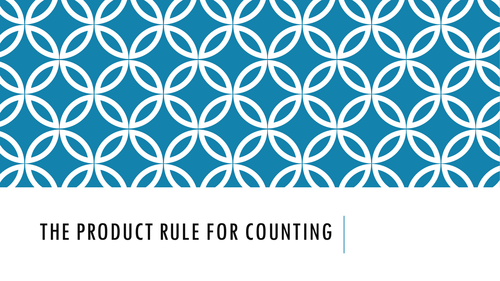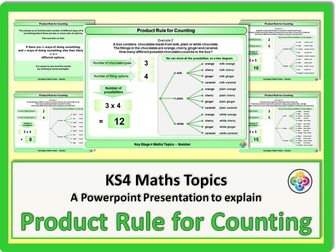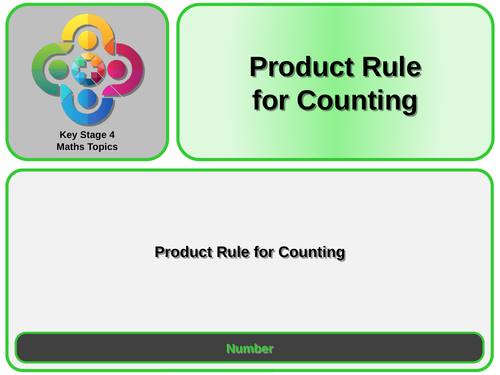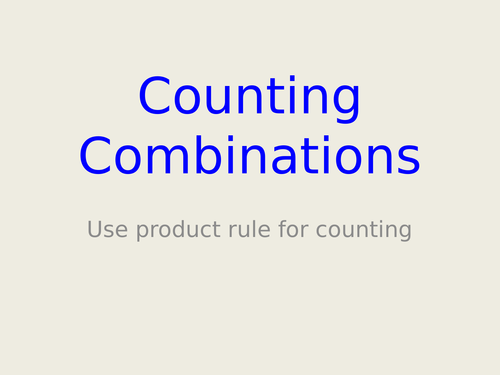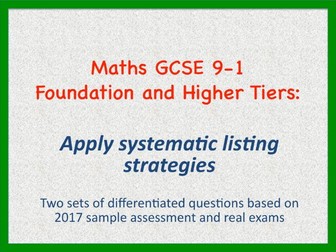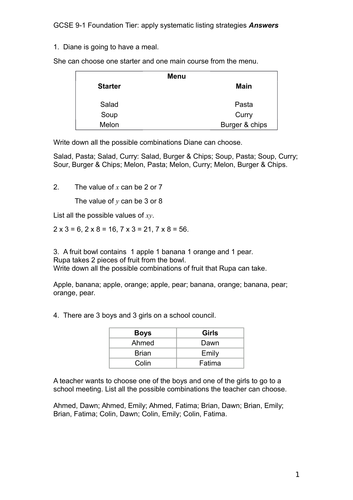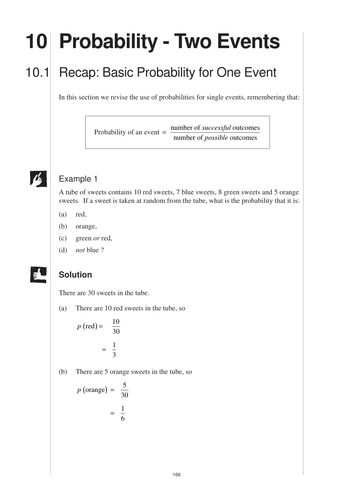Using the product rule for counting
Lesson presentations and activities
This topic is in the new GCSE Sylabus and there was nothing out there about it. Here is a PowerPoint and questions from the specimen papers.
Feedback would be much appreciated!
Enjoy :)Reviews
jhug672 years ago
Excellent resource, thank you.
roots2success3 years ago
Thanks, really useful. The font on the mark scheme was a tiny bit blurred.
russpy3 years ago
Excellent, thanks!
A Powerpoint to explain the Product Rule for Counting. This powerpoint has 16 slides (PLUS one title and one end slide).
The first slide gives the main rule, and there are:
4 slides with examples which show how to find the number of possibilities, together with a tree diagram to show these,
1 information slide,
10 slides with examples using larger numbers, situations where are there more than two “events”, or situations where there are duplicate possibilities (doubles), requiring multiplication then halving.Revised with more slides on: 26 Feb 2020
Designed for KS4 / GCSE.
Reviews
aarya6 years ago
Very good resource and very well presented, Lot of the ideas and efforts have gone into it, would like to see more resources for new GCSE syllabus, Worth value the money.
TES Resource Team8 years ago
Thank you for publishing your resource. It has been selected to be featured in a new secondary maths collection.
GCSE Higher Tier says ‘apply systematic listing strategies, including use of the product rule for counting (i.e. if there are m ways of doing one task and for each of these, there are n ways of doing another task, then the total number of ways the two tasks can be done is m × n ways)’.
A clear, colourful and carefully explained PowerPoint presentation building up the skills from simple matching problems to calculating combinations and permutations in a variety of realistic and original settings, with lots of opportunity for the learner to reflect, apply, and evaluate the problems.
Also available in my shop are two differentiated worksheets of adapted exam questions from sample and real GCSE assessments.
Plus a PDF version that will work on all operating systems.Reviews
TES Resource Team8 years ago
Thank you for publishing your resource. It has been selected to be featured in a new secondary maths collection.
Practice questions, homeworks and assessments
This pack contains three worksheets related to the new GCSE objective on systematic listing and counting strategies.
Worksheet 1: Systematic Listing
Aimed at Foundation Tier students, but also good practice for higher, a set of problems based on systematically listing all the possible options in different situations.Worksheet 2: Product Rule (Multiple Groups)
This sheet requires students to use the product rule in situations where they need to work out the total number of options from several different groups.Worksheet 3: Product Rule (Single Group)
This activity is a further set of product rule questions, but slightly more challenging as it includes questions where students must select items from the same group. (For example, the number of ways of selecting two boys from a group of 8).Answers are included for all three worksheets.
Reviews
TES Resource Team8 years ago
Thank you for publishing your resource. It has been selected to be featured in a new secondary maths collection.
jbrotherson8 years ago
Two sets of questions, differentiated by paper, for learners to complete. Plus answers.
Counting has always been on Foundation, so quite easy for learners.
Sophisticated counting strategies are new to the GCSE higher tier. The specs say:
apply systematic listing strategies, including use of the product rule for counting (i.e. if there are m ways of doing one task and for each of these, there are n ways of doing another task, then the total number of ways the two tasks can be done is m × n ways)
Hence also suitable for revision at A Level Statistics.
All questions follow the format of 2017 exams across the boards, and the SAMs and Mocks available.Reviews
TES Resource Team8 years ago
Thank you for publishing your resource. It has been selected to be featured in a new secondary maths collection.
vince9d8 years ago
Worksheets and activities. The topic of Probability from the Year 8 book of the Mathematics Enhancement Program (MEP). For information about these resources and an index for the whole collection please visit http://www.mrbartonmaths.com/CIMT.htm Keywords: Probability, Chance, Likelihood, Tree Diagram, Systematic Listing, Conditions, Mutually Exclusive, Independent, Impossible, Certain, Relative Frequency, Outcome, Trials, Experiment, Even, Likely, Unlikely, Estimation, Complementary, Addition Law, Multiplication Law.
Reviews
AnnaKirillovna4 years ago
Thank you!
h.humphreys5 years ago
Amazing workbook. Thank you so much for allowing me to use them.
Thandartun226 years ago






